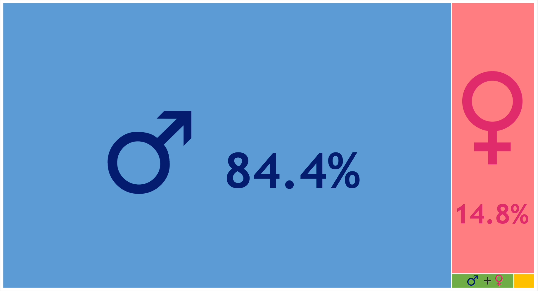Gender bias in names of prokaryotes honouring persons
Gender inequalities in microbiology can be manifested in many different ways. There are well-known unresolved issues, such as the under-representation of women in decision-making bodies in academic, industrial and scientific environments, that deserve awareness and a wide range of actions. Gender equality (Goal 5 of the UN Sustainable Development Goals) should be reflected in the public recognition that is given to outstanding scientists in all fields. In biology, one of the ways in which scientists express this is through the formation of scientific names derived from personal names (eponyms).
The aim of the study was to analyse prokaryotic eponyms from a gender perspective. This is by far the largest analysis of this kind in biological nomenclature and the first time it has been done with bacteria and archaea.
Data were retrieved from the List of Prokaryotic names with Standing in Nomenclature (LPSN). Excluding new combinations, the etymologies of 23,315 unique names at the rank of genus, species and subspecies were analysed. A total of 2018 names (8.7%) are eponyms, for which the development of the female share over time was further investigated.
Women started to be honoured very recently compared to men. The first honoured woman was Delia E. Johnson in 1947, an American microbiologist who pioneered the study of chitinolytic soil bacteria with gliding motility, thanks to the name Cytophaga johnsonae. This was 124 years after the first time a man was honoured, the Italian physicist Serafino Serrati, was honoured with the name Serratia in 1823.
Moreover, only 14.8% of all prokaryotic eponyms refer to females. This ratio has hardly improved since 1947, although the number of women whose contributions to microbiology could have been recognized has increased over time. In years with more than eponyms, the maximum proportion of females recognized was less than 30%. Small percentages of women honoured were not restricted to the distant past: in 1993 and 2015 only 4% of the honoured persons were women, and in 1991, unfortunately, 0%.
The analysis reveals also that the gender gap affects also multiple recognitions. Thus, among the four persons honoured more than seven times were three men, Louis Pasteur, Hans Georg Trüper and Qing-Sheng Fan, but only one female, Wen-Xin Chen.

To reduce the gender gap and make a significant change in the tendency, we encourage authors proposing new taxon names to honour female scientists who can serve as role models for new generations. For that, we compiled lists from independent references that also give remarkable biographical data. Naming prokaryotes after females could at least increase the visibility of women who have contributed to microbiology or other sciences, thus helping young women to find suitable role models.
Image: iStock/Bulat Silvia
